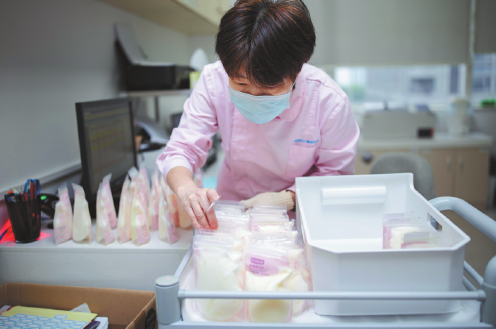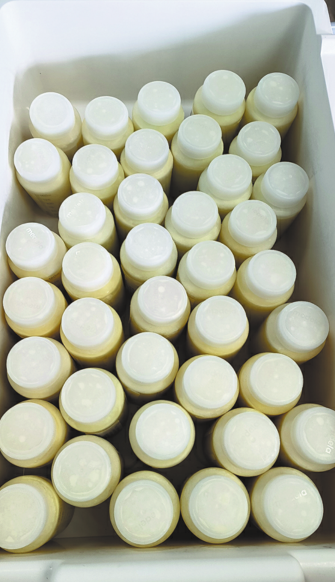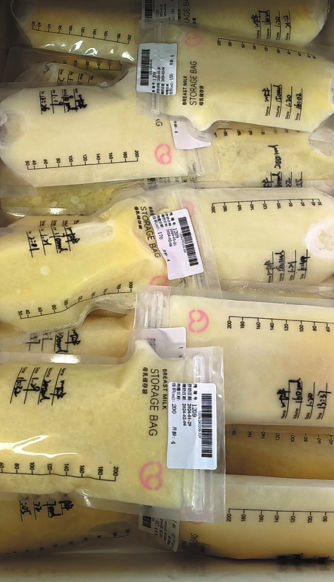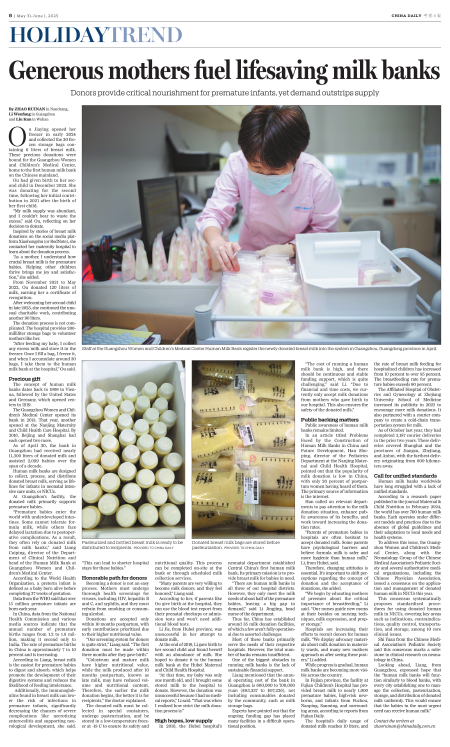
Staff at the Guangzhou Women and Children's Medical Center Human Milk Bank register the newly donated breast milk into the system in Guangzhou, Guangdong province in April.

Pasteurized and bottled breast milk is ready to be distributed to recipients.

Donated breast milk bags are stored before pasteurization.
Ou Jiaying opened her freezer in early 2024 and collected the 30 frozen storage bags containing 6 liters of breast milk. These precious donations were bound for the Guangzhou Women and Children's Medical Center, home to the first human milk bank on the Chinese mainland.
Ou had given birth to her second child in December 2023. She was donating for the second time, following her initial contribution in 2021 after the birth of her first child.
"My milk supply was abundant, and I couldn't bear to waste the excess," said Ou, reflecting on her decision to donate.
Inspired by stories of breast milk donations on the social media platform Xiaohongshu (or RedNote), she contacted her maternity hospital to learn about the donation process.
"As a mother, I understand how crucial breast milk is for premature babies. Helping other children thrive brings me joy and satisfaction," she added.
From November 2021 to May 2022, Ou donated 120 liters of milk, earning her a certificate of recognition.
After welcoming her second child in late 2023, she continued the unusual charitable work, contributing another 90 liters.
The donation process is not complicated. The hospital provides 200-milliliter storage bags to volunteer mothers like her.
"After feeding my baby, I collect any excess milk and store it in the freezer. Once I fill a bag, I freeze it, and when I accumulate around 30 bags, I take them to the human milk bank at the hospital," Ou said.
Precious gift
The concept of human milk banks dates back to 1909 in Vienna, followed by the United States and Germany, which opened centers in 1919.
The Guangzhou Women and Children's Medical Center opened its bank in 2013. That year, another opened at the Nanjing Maternity and Child Health Care Hospital. By 2016, Beijing and Shanghai had each opened two more.
As of April 30, the bank in Guangzhou had received nearly 11,300 liters of donated milk and assisted 2,099 babies over the span of a decade.
Human milk banks are designed to collect, process, and distribute donated breast milk, serving as lifelines for infants in neonatal intensive care units, or NICUs.
At Guangzhou's facility, the donated milk primarily supports premature babies.
"Premature babies enter the world with underdeveloped intestines. Some cannot tolerate formula milk, while others face delayed lactation due to postoperative complications. As a result, they often rely on donated milk from milk banks," said Liang Cuiping, director of the Department of Clinical Nutrition and head of the Human Milk Bank at Guangzhou Women and Children's Medical Center.
According to the World Health Organization, a preterm infant is defined as a baby born alive before completing 37 weeks of gestation.
Data from the WHO said that over 15 million premature infants are born each year.
In China, data from the National Health Commission and various media sources indicate that the annual number of premature births ranges from 1.2 to 1.8 million, making it second only to India. The rate of premature births in China is approximately 7 to 10 percent and is increasing.
According to Liang, breast milk is the easiest for premature babies to digest and absorb, which helps promote the development of their digestive systems and reduces the likelihood of feeding intolerance.
Additionally, the immunoglobulins found in breast milk can lower the risk of infections in premature infants, significantly decreasing the chances of severe complications like necrotizing enterocolitis and supporting neurological development, she said. "This can lead to shorter hospital stays for these babies."
Honorable path for donors
Becoming a donor is not an easy process. Mothers must undergo thorough health screenings for viruses, including HIV, hepatitis B and C, and syphilis, and they must refrain from smoking or consuming alcohol.
Donations are accepted only within 10 months postpartum, with early contributions prioritized due to their higher nutritional value.
"Our screening system for donors is quite strict," Liang said. "The first donation must be made within three months after they gave birth."
"Colostrum and mature milk have higher nutritional value, while the milk produced after 10 months postpartum, known as late milk, may have reduced volume and nutritional content. Therefore, the earlier the milk donation begins, the better it is for recipients," the doctor explained.
The donated milk must be collected in special containers, undergo pasteurization, and be stored in a low-temperature freezer at — 18 C to ensure its safety and nutritional quality. This process can be completed on-site at the bank or through scheduled milk collection services.
"Many parents are very willing to become milk donors, and they feel honored," Liang said.
According to her, if parents like Ou give birth at the hospital, they can use the blood test report from their prenatal checkups or admission tests and won't need additional blood tests.
Li Jie, from Hubei province, was unsuccessful in her attempt to donate milk.
At the end of 2019, Li gave birth to her second child and found herself with an abundance of milk. She hoped to donate it to the human milk bank at the Hubei Maternal and Child Health Hospital.
"At that time, my baby was only one month old, and I brought some stored milk to the hospital to donate. However, the donation was unsuccessful because I had no medical reports," Li said. "That was when I realized how strict the milk donation process is."
High hopes, low supply
In 2016, the Hubei hospital's neonatal department established Central China's first human milk bank. Its primary mission is to provide breast milk for babies in need.
"There are human milk banks in all three of our hospital districts. However, they only meet the milk needs of about half of the premature babies, leaving a big gap in demand," said Li Jingjing, head nurse of the department.
Thus far, China has established around 35 milk donation facilities, of which a few aren't fully operational due to assorted challenges.
Most of these banks primarily serve the needs of their respective hospitals. However, the total number of banks remains insufficient.
One of the biggest obstacles in running milk banks is the lack of sustainable financial support.
Liang mentioned that the annual operating cost of the bank in Guangzhou is 600,000 to 700,000 yuan ($83,337 to $97,226), not including consumables donated by the community, such as milk storage bags.
Experts have pointed out that the ongoing funding gap has placed many facilities in a difficult operational position.
"The cost of running a human milk bank is high, and there should be continuous and stable funding support, which is quite challenging," said Li. "Due to financial and time costs, we currently only accept milk donations from mothers who gave birth in our hospital. This also ensures the safety of the donated milk."
Public backing matters
Public awareness of human milk banks remains limited.
In an article titled Problems Faced by the Construction of Human Milk Banks in China and Future Development, Han Shuping, director of the Pediatrics Department at the Nanjing Maternal and Child Health Hospital, pointed out that the popularity of milk donation is low in China, with only 20 percent of postpartum women having heard of them. The primary source of information is the internet.
Han called on relevant departments to pay attention to the milk donation situation, enhance public awareness of its benefits, and work toward increasing the donation rates.
"Parents of premature babies in hospitals are often hesitant to accept donated milk. Some parents have psychological barriers and believe formula milk is safer and more hygienic than human milk," Li, from Hubei, said.
Therefore, changing attitudes is essential. It's important to shift perceptions regarding the concept of donation and the acceptance of donations, she added.
"We begin by educating mothers of preemies about the critical importance of breastfeeding," Li said. "Our nurses guide new moms at their besides on nursing techniques, milk expression, and proper storage."
Hospitals are increasing their efforts to recruit donors for human milk. "We display advocacy materials about milk donation in maternity wards, and many new mothers approach us after seeing these posters," Li added.
While progress is gradual, human milk banks are becoming more visible across the country.
In Fujian province, the facility at Fujian Children's Hospital has provided breast milk to nearly 1,000 premature babies, high-risk newborns, and infants from Fuzhou, Nanping, Sanming, and surrounding areas, according to reports from Fujian Daily.
The hospital's daily usage of donated milk reaches 10 liters, and the rate of breast milk feeding for hospitalized children has increased from 10 percent to over 85 percent. The breastfeeding rate for premature babies exceeds 90 percent.
The Affiliated Hospital of Obstetrics and Gynecology at Zhejiang University School of Medicine increased its publicity in 2022 to encourage more milk donations. It also partnered with a courier company to create a cold-chain transportation system for milk.
As of October last year, they had completed 3,187 courier deliveries in the prior two years. These deliveries covered Shanghai and the provinces of Jiangsu, Zhejiang, and Anhui, with the farthest delivery originating from 600 kilometers away.
Call for unified standards
Human milk banks worldwide have long struggled with a lack of unified standards.
According to a research paper published in the journal Maternal & Child Nutrition in February 2024, the world has over 700 human milk banks. Each operates under different models and practices due to the absence of global guidelines and their adaptation to local needs and health systems.
To address this issue, the Guangzhou Women and Children's Medical Center, along with the Neonatology Group of the Chinese Medical Association's Pediatric Society and several authoritative medical organizations, including the Chinese Physician Association, issued a consensus on the application and management of donated human milk in NICUs this year.
This consensus systematically proposes standardized procedures for using donated human milk in NICUs, covering key areas such as indications, contraindications, quality control, transportation, and storage, among 10 core clinical issues.
Shi Yuan from the Chinese Medical Association's Pediatric Society said this consensus marks a milestone in clinical research on neonatology in China.
Looking ahead, Liang, from Guangzhou, expressed hope that the "human milk banks will function similarly to blood banks, with every city establishing one to manage the collection, pasteurization, storage, and distribution of donated milk uniformly. This would ensure that the babies in the most urgent need can receive human milk."
Contact the writers at zhaoruinan@chinadaily.com.cn

